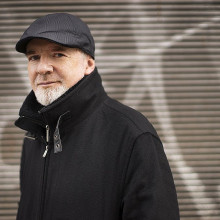Polish literature

Marek Bieńczyk
(born 1956) – author of fiction and essays, historian of literature, translator from French, PAL Literary Research Institute employee and expert on the literature of Polish romanticism and on contemporary French humanities. His academic debut was a paper entitled The Black Man – Zygmunt Krasiński on Death (1990). He has also published two, to some extent complementary books of essays, Melancholy – On Those Who Never Recover What They’ve Lost (1998) and Dürer’s Eyes – On Romantic Melancholy (2002). For Książka twarzy (Face Book, 2011) he received the NIKE award.
Marek Bieńczyk’s exquisite novels, Terminal (1994) and Tworki, (1999) are not free of “gloomy” subject matter either (the experience of loss, mourning and the pain of parting). Nevertheless, although Bieńczyk is always discussing melancholy, both in his essays and in his novels, he has a very special view of it. This is what Bieńczyk himself says about his major theme: “I am interested in creative melancholy, which is strong and productive, and thus is specifically something that, in causing a deep existential crisis followed by an ideological one too, shatters the simple contrasts of hope and despair, fullness and emptiness, desire and its non-gratification; thus melancholy that is active, so to speak, predatory even, broadening our recognition of life, without locking us in stony despair. This sort of melancholy would be revelatory and dynamic.” The pages of Terminal are steeped in this “dynamic melancholy”; it is a post-modernist romance in which an inevitable, final parting with a lover by no means leads to “stony despair”, but acts as an incentive for creativity. Bieńczyk is attracted to the inexpressible, things that are impossible to put into words. In Terminal he wonders how we can talk about love at all, when everything has already been said about it. When a man who’s in love talks about his feelings, is he just a worthless plagiarist? Is he really declaring love, or is he just uttering the ready-made language and set formulae of his culture? In Tworki Bieńczyk deals with an exceptional loss and an incomprehensible absence, i.e. the horrifying experience of the Holocaust, which we are used to regarding as inexpressible. The novel is set in 1943, and the main characters are a small group of likable twenty-year-olds, girls and boys, Poles and Jews, who work at a psychiatric hospital under German management in Tworki in the Warsaw suburbs (hence the title). It turns out that the only normal place in an abnormal world is this institution for the insane. In their free time the young people have fun, flirt, walk about the picturesque area and recite poetry, as if the hell of Nazi occupation doesn’t affect them. But, quietly and imperceptibly, without any explanation, each of the heroes disappears from the pages of the novel in turn. They leave behind farewell letters that can never be answered, because their senders are no longer alive. The story ends with a challenge to future readers to “acknowledge receipt” and write their own post-scripts. Marek Bieńczyk has also published a collection of erudite, but humorous articles on the art of drinking wine.
BIBLIOGRAPHY
- Czarny człowiek. Zygmunt Krasiński wobec śmierci (esej), Warszawa: IBL, 1991.
- Terminal, (powieść), Warszawa: PIW, 1994; II wyd. Wielka Litera, 2012.
- Melancholia. O tych, co nigdy nie odnajdą straty (esej), Warszawa: Sic!, 1998, 2000; Świat Książki, 2012.
- Tworki, Warszawa: Sic!, 1999; II wyd. Wielka Litera, 2012.
- Kroniki wina, Warszawa: Sic!, 2001.
- Oczy Dürera. O melancholii romantycznej, Warszawa: Sic!, 2002.
- Przezroczystość, Kraków: Znak, 2007.
- Książka twarzy, Warszawa: Świat Książki, 2012.
- Jabłko Olgi, stopy Dawida, Warszawa: Wielka Litera, 2015.
TRANSLATIONS
Bulgarian:
- Melancholija [Melancholia. O tych, co nigdy nie odnajdą straty], transl. Desislava Nedâlkova, Martina Ajkova-Gurecka, Sofia: Sonm, 2002.
- Kniga na liceto [Książka twarzy], transl. Margreta Grigorowa, Sofia: Faber, 2015.
- Psihiatrična bolnica "Tvorki" [Tworki], transl. Desislava Nedâlkova, Sofia: Izdatelstvo "Panorama", 2017.
- Прозрачността [Przezroczystość], transl. Milena Mileva, Sofia: Sonm, 2019.
Czech:
- Sanatorium Tworki [Tworki], transl. Michael Alexa, Příbram: Pistorius & Olšanská, 2019.
English:
- Tworki, transl. Benjamin Paloff, Evanston, IL: Northwestern University Press, 2008.
- Transparency [Przezroczystość], transl. Benjamin Paloff, Champaign; Dublin; London: Dalkey Archive Press, 2012.
- Prince in a Pastry Shop [Książę w cukierni], transl. Benjamin Paloff, Wrocław: Format, 2014.
French:
- Terminal, transl. Jean-Yves Erhel, Paris: Gallimard, 1997.
- Tworki, transl. Nicolas Véron, Paris: Denoël, 2006.
- Le prince à la pâtisserie [Książę w cukierni], transl. Nicolas Véron, Wrocław: Format, 2014.
German:
- Terminal, transl. Karin Wolff, Herne: Tibor Schäfer Verlag, 2000.
Hungarian:
- Melankólia: kik már sohsem találnak a vesztett üdvre [Melancholia: o tych, co nigdy nie odnajdą straty], transl. Lajos Pálfalvi, Göd: Rézbong Kiadó, 2019.
Spanish:
- Tworki (el manicomio), transl. Maila Lema Quintana, Barcelona: Acantilado, 2011.
- Melancolía. De los que la dicha perdieron y no la hallarán más [Melancholia. Za tych, co nigdy nie odnajdą straty], transl. Maila Lema Quintana, Barcelona: Acantilado, 2014.
Ukrainian:
- Knyha obłych [Książka twarzy], transl. Ostap Sływynsky, Lviv: LA "Piramida", 2015.